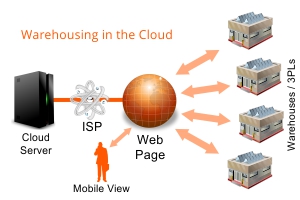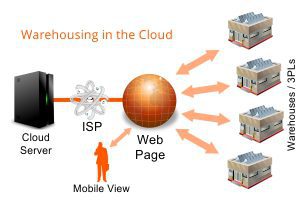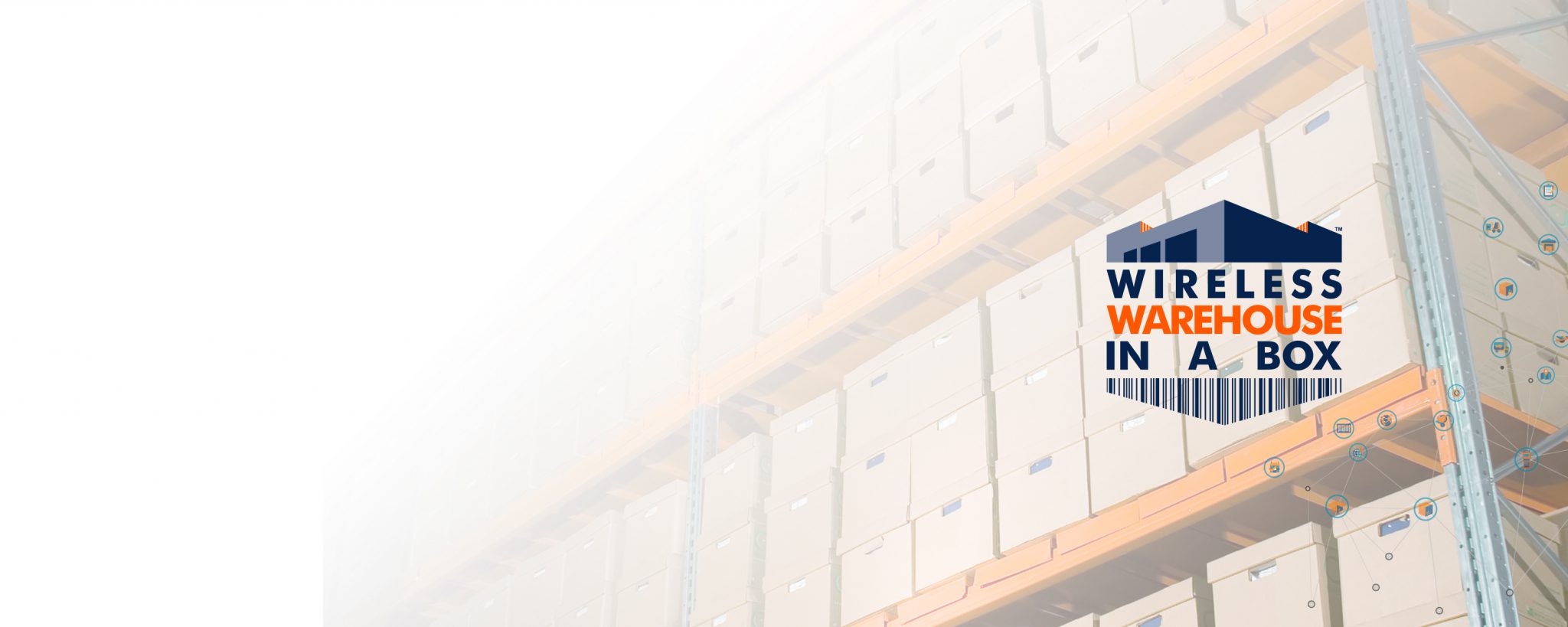Cloud Computing vs On Premise WMS
In the past couple of years, cloud computing usages has grown from being a simple business concept for software users to becoming one of the fastest growing technologies in the IT industry.
Considering the ease of installation and speed of initial access, businesses are tapping more and more into the cloud due to the proposed reduction on their infrastructure resources and costs. Although everything about solutions in the Cloud sounds great is it really something everyone should be moving towards? Is it living up to the hype it has brought? Is it something best suited for business to consumer, or decentralized work-forces? Is it really the solution that the supply chain industry should be moving towards?
connect™ Your Warehouse
Cloud computing is a style of centralized computing, which has been around since the late 60s. It is largely noted for quick scalability and deployment, with reduced IT maintenance as the main server/data is located outside of the four walls. This service today is typically provided ‘as a service’ (SaaS), which is leading to a great deal of confusion between the two. Rather than utilizing local infrastructure in-house, customers would use their internet connection to visit a URL hosted by their cloud solution provider’s infrastructure. To get a better understanding in detail about what Cloud computing is, please visit – http://uptothecloud.6dg.co.uk/
Cloud vs. Local
Cloud based computing is often in the thoughts of a warehouse owner due to its overlying benefits such as; lower costs in IT maintenance, increased information accessibility, and quicker deployment times for solutions. In reality, all of these benefits exist but can be explained further to acquire their true meaning and are no restriction for locally based solutions.
Lower IT Maintenance Costs



 Cloud solution providers explain that your cost of maintenance is far less in the cloud versus maintenance of a local based solution. In retrospect, majority of the SME space can run a solution off a single server (or desktop) specifically purchased for the solution and is meant to last for the lifetime of the solution implemented. This would leave the maintenance costs only on the client side devices, unavoidable even to a cloud based solution.
Cloud solution providers explain that your cost of maintenance is far less in the cloud versus maintenance of a local based solution. In retrospect, majority of the SME space can run a solution off a single server (or desktop) specifically purchased for the solution and is meant to last for the lifetime of the solution implemented. This would leave the maintenance costs only on the client side devices, unavoidable even to a cloud based solution.
In addition, Cloud based solutions require it’s users to work around their schedule and rely on their ability to maintain uptime which will conflict with your daily operations and set schedule. From unpredictable system maintenance downtime, to in-the-dark complications with the cloud based solution (I.e. Server down, Internet Browser Issues, Connection Speeds, etc.) and making an attempt to contact their third party support representatives for assistance. In comparison to a local solution, when you own your infrastructure – You are now working based around your own schedule based on your specific operational needs without sudden downtime or roadblocks out of your control.
Increased Information Accessibility
Yes, Cloud computing does make room for better accessibility anywhere with an internet connection – but knowing the reputation of our ISPs and the large volumes of users who are taking advantage of the internet; Internet Service Providers are beginning to throttle bandwidth and continually limit your connection speed unless you’re a Tier 1 player with T1 capability (we know this is not practical for SME space). Already knowing about the inevitable results of internet reliability, solely relying 100% on its connection probably isn’t the best of choices when operating your entire enterprise with it. Most ISP promote uptimes at around 99.5% of the time. What this translates into is approximately 43 hours of unexplained inability to connect to your critical enterprise data.
Systems Logic does offer a Cloud feature (CLOUDconnect) within its application, although it isn’t the sole application, this is a tool enabling users (warehouse owners, sales teams, operators and customers) to review their inventory and order statuses from an internet connection but does not interfere with the local operations between the four walls of your warehouse. To read more about CLOUDconnect, please visit this page.
Quicker Deployment
Cloud solutions are simple and easy to deploy and warehouse owners are told that it is as simple as opening up the web browser on your desktop or mobile device and you’re ready to go! These facts are true (you may encounter browser related issues and security impairments), although not a limitation when using a local based infrastructure. Additionally, this is only referring to installation, not implementation, which are two different animals. Installation is the process whereby the solution is made available to enterprise, while implementation involves setup of key business information and processes as well as training of staff.
A lot faster to implement a Cloud based solution than a locally based solution, right? Wrong.
Today, installation of a locally based .NET solution is as simple as receiving an email and completing a copy/paste onto your server. They will also include the ability to auto-deploy to all devices (I.e. Desktops, Scanners, etc.) without manually attending all devices for installation. Updates thereafter are automatically pushed to your site and all devices. This means that there is no need to go desktop to desktop, or to collect the mobile devices to ensure they have been brought up to date. Newer ‘push’ technologies deliver the exact same benefits to the solution within your walls.
Information Security and Integrity
Often forgotten, but particularly important is the integrity and security of your information stored in the Cloud. A survey conducted by Pricewaterhouse Coopers showed that more than three quarters of respondents across a range of different businesses believed that Cloud computing did not increase their security risk. A hope which held no regard after a report published by security firm Imperva which highlighted the simplicity of hacking even one of the world’s largest online companies which could access their customer’s private information. (Ref. Imperva Attack Report – http://bit.ly/12cZSjj)
Considering vulnerability and the growth in popularity of cloud based solutions; breaches of the software have been proven to occur more often than not resulting in the reduction of infrastructure integrity and appeal to potential threats. Customers interested in Cloud based solutions must ensure that they are reviewing and validating the reputation of their provider, making sure that their data is in good hands – The reason to why organizations like ‘Cloud Security Alliance’ (cloud computing security company) exist are because of the size and scope of potential issues and compromised cloud solutions.
The top security breaches due to threats towards cloud solutions are as follows –
(This survey was completed by cloud users including consumers, service providers and consultants around the world.)
91% Data Loss / Leakage
90% Insecure APIs
87% Account/Service & Traffic Hijacking
88% Malicious Insiders
84% Abuse of Cloud Computing
82% Unknown Risk Profile
81% Shared Technology Vulnerabilities
81% Distributed Denial of Service (DDoS)
(Ref. Top Threats to Cloud Computing PDF – Cloud Security Alliance http://bit.ly/11XY8eN
In comparison to a local based solution, having to mind major security requirements is non-existent. Your data is completely secure within your localized server making the ability of outside attacks irrelevant. Encryption over your wired and wireless connections are an obstacle that is regularly encountered no matter what type of solution is put in place.
If you would like to read more about the security of Cloud computing, please read –
Seven Technical Security Myths of the Cloud – Infosecisland.com, http://bit.ly/13eH04e
What you see is what you get
Costs in terms of Cloud versus Local solutions can be compared to buying versus renting a home. Local solutions appear to be more expensive, but these are the upfront costs which aren’t divided into endless payments over the course of your contract – otherwise known as Cloud billing. Staying local allows you to retain your assets after completing the purchase and now giving you complete ownership over your solution, system and data. On the Cloud side, you are purchasing a temporary rental location for your business to park at while making data transactions, you will not own the infrastructure and your money sort of floats into the sky; No pun intended.
If circumstances came to be that a business wished to move from one Cloud provider to another, or to a local solution they would then be faced with mountains of excel sheet data which would need to be transferred over. Details that you wish you should have known ahead of time as you are now left with something that may appear overwhelming – We know what they’ve been through.
IMG OF CHART MISSING…..
More About Us
Free Warehouse Management Brochure
Features & Functionality | Cloud Solution | Local LegacyTechnology (Pre-2002) | Local NewTechnology (Post-2002) |
|---|---|---|---|
Minimized maintenance and hardware support requirements
| |||
Increased information and data accessibility | |||
Simple and quick to deploy on-site across all platforms | |||
Browser or operating system compatibility | |||
Mobile visibility anywhere with an internet connection | |||
User interface design and flexibility based on device model | |||
Solution scalability based on business size and operators | |||
Compatibility with existing company peripheral and devices | |||
Functionality of the solution without an internet connection | |||
Information privacy and control over collection | |||
Completed robust and enhanced security of your information | |||
Controlled downtime and expected solution updates | |||
Ownership of not only your data but your complete infrastructure |



